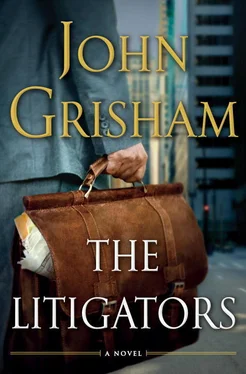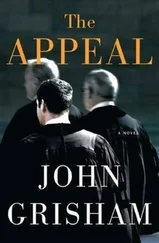The rainbow was completed when Ms. Karros called to the stand a young Korean doctor from San Francisco who, oddly enough, looked remarkably similar to juror Number 19. Dr. Pang enthusiastically endorsed the drug and expressed dismay at its removal from the market. He had given it to hundreds of patients with outstanding results.
David had no questions for Dr. Pang either. He was not about to bicker with any of these renowned doctors. What was he supposed to do — argue medicine with some of the best doctors in the business? No sir. He stayed in his chair and kept one eye on his watch, which was moving rather slowly.
There was no doubt that had there been a juror of Lithuanian descent, Nadine would have pulled another expert from her magic hat, one with a Lithuanian surname and immaculate credentials.
The fifth witness was the chief cardiologist at the Feinberg School of Medicine, Northwestern University. Her name was Dr. Parkin, and her testimony was a little different. She had been hired to do a thorough analysis of Percy Klopeck’s medical history. She had reviewed his records from the age of twelve and those of his siblings and parents to the extent they were available, and she also had taken recorded statements from his friends and co-workers, those willing to cooperate. At the time of his death, Percy was taking Prinzide and Levatol for hypertension, insulin for adult-onset diabetes, Bexnin for arthritis, Plavix as a blood thinner, Colestid for atherosclerosis, and Krayoxx for high cholesterol. His happy pill of choice was Xanax, which he either bummed off friends, stole from Iris, or bought online, and he used it daily to battle the stress of life with “that woman,” according to one of his co-workers. He occasionally used Fedamin, an over-the-counter appetite suppressant that was supposed to make him eat less but seemed to backfire. He had smoked for twenty years but managed to stop at the age of forty-one with the aid of Nicotrex, a nicotine-laced chewing gum that was known to be highly addictive. He chewed it nonstop, going through at least three packages a day. According to blood work a year before he died, Percy’s liver was showing a decreasing level of function. He loved gin and, according to credit card records subpoenaed by Ms. Karros, purchased at least three fifths a week from Bilbo’s Spirits on Stanton Avenue, five blocks from his home. He often felt bad in the morning, complained of headaches, and kept at least two large bottles of ibuprofen close by on his cluttered work desk.
When Dr. Parkin finished her lengthy narrative about Percy’s habits and health, it seemed patently unfair to blame his death on just one drug. Since there had been no autopsy — Iris had been too upset to even think about it — there was no positive indication that he died of a heart attack. His death could have been caused by the all-encompassing “respiratory failure.”
Wally and Oscar had discussed having the body exhumed to get a clearer picture of what killed him, but Iris flew into a rage. Plus, the exhumation, autopsy, and reburial would have cost almost $10,000, and Oscar flatly refused to spend the money.
In Dr. Parkin’s opinion, Percy Klopeck had died young because he was genetically predisposed to an early death, one made even more probable because of his lifestyle. She also offered the opinion that it was impossible to predict the cumulative effect of the astonishing barrage of his medications.
Poor Percy, thought David. He lived a short, uneventful life and died peacefully in his sleep, with no clue whatsoever that his habits and ailments would one day be dissected so thoroughly by strangers in open court.
Her testimony was devastating, and there was not a single part of it that David wanted to revisit on cross-examination. At 12:30, Judge Seawright adjourned until 2:00 p.m. David and Helen hustled from the courthouse and enjoyed a nice, long lunch. David ordered a bottle of white wine, and Helen, who rarely drank, enjoyed a glass. They toasted Percy, may he rest in peace.
In David’s novice opinion, Nadine and the defense stumbled slightly with the afternoon’s first witness. He was Dr. Litchfield, a cardiologist and cardiovascular surgeon from the world-renowned Cleveland Clinic, where he saw patients, taught, and researched. He had the tedious task of walking the jurors through Percy’s last echocardiogram, the same video that had knocked them out in the hands of Igor Borzov. Sensing that another viewing of that footage would not be well received, Nadine stepped on the gas and opted for a scaled-down version of the testimony. Bottom line — there was no reduced regurgitation of blood from the mitral valve. The left ventricle was not enlarged. If the patient did indeed die of a heart attack, its cause could not be determined.
Bottom line — Borzov was a fool.
David had a quick vision of Wally, lying peacefully in a comfortable bed, wearing a gown or pajamas or whatever Harbor House distributed, sober now, tranquil due to a sedative, maybe reading or just gazing at Lake Michigan, his thoughts a million miles away from the carnage in Courtroom 2314. Yet it was all his fault. In the months he’d spent racing around Chicago, visiting low-end funeral parlors, passing out brochures in gyms and fast-food joints, he had never, not once, paused to study the physiology and pharmacology of Krayoxx and its alleged damage to heart valves. He had simply and eagerly assumed the drug was bad and, egged on by smart guys like Jerry Alisandros and other tort stars, had joined the parade and begun counting his money. Resting now in rehab, was he even thinking about the trial, about the case getting dumped on David while he and Oscar were laid up licking their wounds? No, David decided, Wally was not worrying about the trial. Wally had bigger issues — sobriety, bankruptcy, a job, his firm.
The next witness was a professor and medical researcher from Harvard who had studied Krayoxx and written a definitive article in the New England Journal of Medicine . David managed to get a slight chuckle when he did not question the professor’s résumé. He said, “Your Honor, if he went to Harvard, I’m sure his credentials are outstanding. He must be brilliant.”
Fortunately, the jurors had not been informed that David was a graduate of the Harvard School of Law; otherwise, the wisecrack could have backfired. Harvard grads who talked about being Harvard grads were not generally well regarded in Chicago.
“Pretty stupid,” read the note from the paralegal.
David did not respond. It was almost 4:00 p.m., and he just wanted to leave. The professor droned on about his research methods. Not a single juror was paying attention. Most appeared brain-dead, thoroughly numbed by this futile exercise in civic responsibility. If this is what made a democracy strong, then God help us.
David wondered if they were already discussing the case. Each morning and each afternoon Judge Seawright gave the same lecture about improper contact, the prohibition against reading about the case in the newspapers or online, and the need to refrain from chatting about the case until all evidence had been presented. There were plenty of studies on the behavior of juries, the dynamics of group decision making, and so on, and most found that jurors couldn’t wait to begin gossiping about the lawyers, the witnesses, even the judge. They tended to pair off, to buddy up, to separate into cliques and camps and begin their considerations prematurely. Seldom, though, did they do so as an entire group. More often, they hid their little private sessions from each other.
David tuned out his fellow Harvard alum and flipped a few pages of his legal pad. He resumed work on a rough draft of his letter:
Dear So-and-So:
I represent the family of Thuya Khaing, the five-year-old son of two Burmese immigrants who are in this country legally .
Читать дальше












